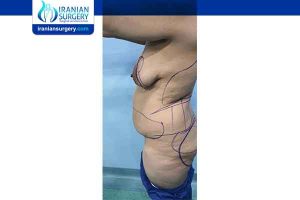My bmi is 35 can i get a tummy tuck surgery?
What should your bmi be for a tummy tuck?
What BMI do you need for a tummy tuck?
What is the ideal weight for tummy tuck?
What is BMI?
The body mass index (BMI) is a measurement of an individual's weight according to his or her height. It is widely used as an indicator of the amount of a person's body fat. There are better ways to measure body fat specifically, but determining a person's BMI is fast and serves as an easy screening method.

Read more about : Abdominoplasty Podcast with Dr. Afshan shah
Read more about : Abdominoplasty with liposuction surgery , before and after surgery videos
Read more about : Abdominoplasty and Breast reduction and bbl surgery , before and after surgery videos
BMI Ranges
BMI of 18 and under: You may be underweight for your height. If your BMI is under 18, you should consult with your doctor about your overall health. Smoking, a history of poor nutrition, and eating disorders can cause a person to be underweight, and these all increase the risks of any surgery.
BMI of 19 to 24: Having a BMI in this range is considered to be good. You are in a healthy weight range. Most people who are at a healthy weight for their height are good candidates for plastic surgery.
BMI of 25 to 29: Having a BMI in this range puts you in a category generally thought to be overweight. If you are interested in procedures such as liposuction and Tummy Tuck, your surgeon might advise you to lose enough weight to be within 20-30 pounds of your healthy weight range before having surgery.
BMI of 30 to 39: A person with a BMI in this range is considered to be "obese." People with a BMI in this range are at high risk for developing weight-related health problems. Again, a person has to be within about 30 pounds of their "healthy" weight before plastic surgery.
BMI of 40 and above: A person with a BMI in this range is considered to be "morbidly obese." People with a BMI in this range carry a severe risk of potentially fatal weight-related health problems, including heart disease, diabetes, and joint problems. Morbidly obese people who fall in this range will rarely be accepted as candidates for cosmetic plastic surgery.

Read more about : Ideal BMI for liposuction surgery
Read more about : Tummy tuck
Read more about : Abdominal etching
Read more about : Bbl (Brazilian Butt Lift )
Relation between BMI and Plastic Surgery
In general, the higher your BMI is the more likely you are to have health problems that are related to your weight, such as diabetes, heart disease, and joint problems. Other problems that are often seen in people with a high BMI are asthma, sleep apnea, and gastroesophageal reflux.
Your BMI is your weight in kilograms divided by the square of you height in meters. Even If you live in Europe and are used to thinking in kilos and meters, figuring out your BMI takes a calculator. However, we have made it easy by providing a BMI calculator for you. Just enter your weight in pounds and your height in feet and inches and it will calculate your BMI.
Generally, body contouring plastic surgery procedures such as liposuction, abdominoplasty (Tummy Tuck), and lift procedures (thigh lift, body lift, arm lift) are reserved for people who are within 15% to 20% (or 20 to 30 pounds) of their goal weight. These procedures are not intended as weight loss surgery. If you have these surgeries and later lose a lot more weight, you may have to redo the surgery.
Many plastic surgeons do not recommend tummy tuck for anyone more than 20 to 30 pounds over their ideal weight for their height. This approximately translates to a BMI of between 28 and 33.
Plastic surgery is not a substitute for losing weight through other means, such as diet and exercise or weight loss surgery. Generally, a person with a BMI over 30 (obese) or 35 (clinically obese) is at greater risk during any surgery. There is a greater chance of a complication from the procedure and from the anesthesia. As noted before, obesity is often linked to diabetes, circulatory problems, and other health issues, which are further complications for surgery.
Read more about : How to massage lumps after liposuction?
Read more about : Does fat transfer work for breast augmentation?
Read more about : Liposuction results week by week
Read more about : Maximum weight for liposuction
Read more about : How to get rid of fluid after liposuction?
Read more about : Does liposuction hurt?
Read more about : Lipomatic

Relation between BMI and Tummy Tuck
Your relative weight (BMI) is an important factor when considering a tummy tuck.
It is generally accepted by reputable plastic surgeons that if one’s body mass index (BMI) is 40 or above, a level that stratifies one as morbidly obese, you should not undergo a tummy tuck. Because of elevated surgical and anesthesia risks, some plastic surgeons won’t even operative on someone whose BMI is above 30.
People with a BMI of 30 or higher have a significantly increased risk for:
. Blood loss during the procedure.
. Fluid collections in the abdomen.
. Blood clots in the legs (deep vein thrombosis).
. Blood clots in the lungs (pulmonary embolism).
. Post-operative pneumonia.
. Wound separation (where the edges no longer meet).
. Would healing problems (like dryness, ulcers, sensitivity, etc.).
. Infections
For those individuals with a BMI between 30 but under 40, this can be a gray zone where multiple factors should be considered when determining whether one is a present and acceptable candidate for a tummy tuck. This decision can be made during a comprehensive consultation with a reputable board certified plastic surgeon.
It is indisputable, however, that the closer one is to one’s ideal body weight range, the more striking and positive the results can be, with everything else being equal. In reality, the majority of patients considering a tummy tuck will never be able to get back to their ideal weight but that does not mean that they shouldn’t have this procedure or that they won’t get great results. On the contrary, you can still get great results even if you are above your ideal weight.
For my patients considering undergoing a tummy tuck who are substantially above their ideal weight but are still candidates for surgery, we strongly recommend that they try to lose as much of this excess weight as possible prior to proceeding. With much less of the bulky fat, contouring and tightening of the tissues during surgery can be more extensive yielding even more dramatic results.
Individuals who are not presently candidates for a tummy tuck because of their excess weight are strongly recommended to seek out weight loss regimens along with exercising. Some may even benefit from surgical weight loss procedures. If they are sincerely motivated, many can successfully lose more than enough weight to make them good candidates for surgery.
Read more about : Liposuction in Iran
Read more about : Vaser liposuction
Read more about : Lipomatic


